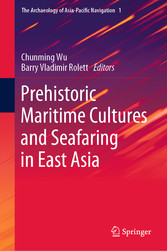Suche
Lesesoftware
Info / Kontakt
Prehistoric Maritime Cultures and Seafaring in East Asia
von: Chunming Wu, Barry Vladimir Rolett
Springer-Verlag, 2019
ISBN: 9789813292567 , 332 Seiten
Format: PDF
Kopierschutz: Wasserzeichen



Preis: 149,79 EUR
eBook anfordern 
This book focuses on prehistoric East Asian maritime cultures that pre-dated the Maritime Silk Road, the 'Four Seas' and 'Four Oceans' navigation system recorded in historical documents of ancient China. Origins of the Maritime Silk Road can be traced to prosperous Neolithic and Metal Age maritime-oriented cultures dispersed along the coastlines of prehistoric China and Southeast Asia.
The topics explored here include Neolithisation and the development of prehistoric maritime cultures during the Neolithic and early Metal Age; the expansion and interaction of these cultures along coastlines and across straits; the 'two-layer' hypothesis for explaining genetic and cultural diversity in south China and Southeast Asia; prehistoric seafaring and early sea routes; the paleogeography and vegetation history of coastal regions; Neolithic maritime livelihoods based on hunting/fishing/foraging adaptations; rice and millet cultivation and their dispersal along the coast and across the open sea; and interaction between farmers and maritime-oriented hunter/fisher/foragers. In addition, a series of case studies enhances understanding of the development of prehistoric navigation and the origin of the Maritime Silk Road in the Asia-Pacific region.
?Chunming Wu ( B.A. and M.A. in Archaeology and PH.D. in Chinese History from Xiamen University) is currently a researcher at Xiamen University's Center for Maritime Archaeology. Dr. Wu's interests are in the field of maritime archaeology, and the prehistoric culture and early aboriginal ethno- history of southeast China and Southeast Asia. He was awarded a visiting scholarship by the American Council of Learned Society & Luce Foundation at the University of Hawaii at Manoa, and Harvard Yenching Institute, Harvard University.
He has published 6 monographs: Archaeological Research of the History and Cultures of Prehistoric Aboriginals in Southeast China (1999), Archaeological Research of Capital of Min-Yue Kingdom of Han Dynasty(1998), The Shipwreck Archaeology in Seas Surrounding China (2003), Maritime Archaeology (2007), The Maritime Cultural Interaction between Indigenous Yue and Austronesian (2012), The Archaeological and Historical Research on the Maritime Cultural Heritage (2016), and more than 150 academic papers.
Barry Vladimir Rolett (Pomona College, B.A.; Yale University, M.Phil. and Ph.D.) is a professor of Anthropology at the University of Hawaii at Manoa. He has conducted archaeological research in Polynesia and on the coast of southeast China. Polynesian origins can be traced to southeast China, explaining why his research drew him there.Dr. Rolett's work in China is collaborative and interdisciplinary, investigating Neolithic cultures, maritime adaptation, the spread of rice agriculture and the ultimate origins of the Polynesians. As part of this work, he helped initiate the first Sino-American collaboration for archaeological research in Fujian.
In the Marquesas Islands of French Polynesia, Dr. Rolett has led more than twenty expeditions and collaborated with the local community to establish the Te Ana Peua archaeology museum, which exhibits and curates the artifacts discovered during their projects.
This book focuses on prehistoric East Asian maritime cultures that pre-dated the Maritime Silk Road, the 'Four Seas' and 'Four Oceans' navigation system recorded in historical documents of ancient China. Origins of the Maritime Silk Road can be traced to prosperous Neolithic and Metal Age maritime-oriented cultures dispersed along the coastlines of prehistoric China and Southeast Asia.
The topics explored here include Neolithisation and the development of prehistoric maritime cultures during the Neolithic and early Metal Age; the expansion and interaction of these cultures along coastlines and across straits; the 'two-layer' hypothesis for explaining genetic and cultural diversity in south China and Southeast Asia; prehistoric seafaring and early sea routes; the paleogeography and vegetation history of coastal regions; Neolithic maritime livelihoods based on hunting/fishing/foraging adaptations; rice and millet cultivation and their dispersal along the coast and across the open sea; and interaction between farmers and maritime-oriented hunter/fisher/foragers. In addition, a series of case studies enhances understanding of the development of prehistoric navigation and the origin of the Maritime Silk Road in the Asia-Pacific region.
He has published 6 monographs: Archaeological Research of the History and Cultures of Prehistoric Aboriginals in Southeast China (1999), Archaeological Research of Capital of Min-Yue Kingdom of Han Dynasty(1998), The Shipwreck Archaeology in Seas Surrounding China (2003), Maritime Archaeology (2007), The Maritime Cultural Interaction between Indigenous Yue and Austronesian (2012), The Archaeological and Historical Research on the Maritime Cultural Heritage (2016), and more than 150 academic papers.
Barry Vladimir Rolett (Pomona College, B.A.; Yale University, M.Phil. and Ph.D.) is a professor of Anthropology at the University of Hawaii at Manoa. He has conducted archaeological research in Polynesia and on the coast of southeast China. Polynesian origins can be traced to southeast China, explaining why his research drew him there.
Dr. Rolett's work in China is collaborative and interdisciplinary, investigating Neolithic cultures, maritime adaptation, the spread of rice agriculture and the ultimate origins of the Polynesians. As part of this work, he helped initiate the first Sino-American collaboration for archaeological research in Fujian.
In the Marquesas Islands of French Polynesia, Dr. Rolett has led more than twenty expeditions and collaborated with the local community to establish the Te Ana Peua archaeology museum, which exhibits and curates the artifacts discovered during their projects.





